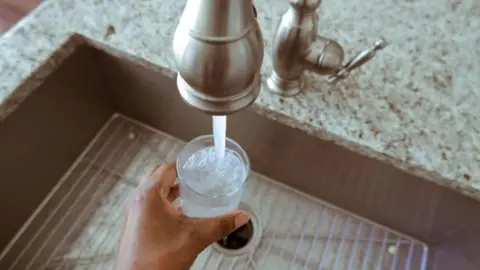Erin Brockovich: California water battle 'woke me up'
 Courtesy Erin Brockovich
Courtesy Erin BrockovichErin Brockovich talks about her new case on "forever chemicals" in our water, and their potential wide-spread health impact.
This story contains strong language.
The name Erin Brockovich has become synonymous with those who investigate and hold corporations to account for polluting people's water.
Actor Julia Robert's sassy film portrayal of the single mum's key role in winning the largest settlement ever awarded at the time for a direct-action lawsuit against Pacific Gas & Electric (PG&E), made her a household name.
She did this without legal, medical, or scientific training. The case alleged contamination of the water with the carcinogen hexavalent chromium, in the southern California town of Hinkley.
"Hinkley woke me up", says Brockovich.
"Everyone said the two-headed frog and the green water was normal. I'm like 'bullshit,'" she shouts in a way that those familiar with the film will recognise.
Working as a legal clerk for Masry & Vititoe, she helped to secure $333m (£240m) for over 600 plaintiffs who alleged injury from drinking contaminated water.
Despite the win, there was no Hollywood ending for the community according to Brockovich: "Hinkley's gone now."
PG&E bought people's homes sitting on contaminated land and bulldozed them to prevent squatters. "Now it's just a desert and underneath it a very toxic plume that PG&E will carry on their books to clean up for years to come," she says.
Even with on-going clean-up efforts, hexavalent chromium (also known as chromium-6, a chemical that has been shown to cause lung cancer when inhaled by humans) still haunts the plaintiffs, as the plume continued to spread.
"After the case, Roberta Walker, the first person that I started working with in Hinkley, moved a good distance away. But the new plume found her."
According to Brockovich PG&E recently bought Walker's house and she has moved away. "Talk about getting struck by lightning twice" says Brockovich.
She says many of the people involved have suffered cancer, reproductive issues, and some sixty former plaintiffs have passed away.
PG&E say they are working "to clean up chromium-6 in groundwater resulting from historical operations at the Hinkley Compressor Station. We continue to make progress. We've taken action to stop the migration of affected groundwater, and we're operating numerous treatment systems to clean up the groundwater".
Brockovich says: "Litigation is never enough. The money helps, but it won't stop a disease from progressing."
 Courtesy Erin Brockovich
Courtesy Erin BrockovichYet she and the Hinkley lawyers have faced criticism that they took too much money from the settlement.
The law firm got over $133m and Brockovich received $2m. It's a question that comes up in communities a lot.
Brockovich explains that it costs law firms millions of dollars to take on these cases and that, if they lose, the firm gets saddled with the debt. But she believes lawyers might have to lower their contingency fees.
"You have to take a look at what happened in Flint, Michigan where residents have secured over $640m for the contamination of their water with lead. And it's coming into question that over $200m of that will go to the attorneys."
In Flint, the state, as cost-cutting measure, stopped bringing in water from nearby Detroit and instead switched the water supply to the Flint River. The water wasn't properly treated and corroded the aging lead pipes, introducing high levels of lead into the drinking water.
It's a problem playing out across the country, which has an aging infrastructure that will take huge investment to replace.
 AFP via Getty Images
AFP via Getty Images"It's frustrating. I began my work when I was 30 years old. I'm now 60 and the same conversation is happening. Except it's just worse," explains Brockovich.
Nearly 200 million Americans across the country are exposed to unsafe levels of the Hinkley chemical, according to analysis of Environmental Protection Agency (EPA) data by the non-profit researchers, the Environmental Working Group. This is just one chemical of many blighting the environment.
The EPA's Toxic Release Inventory shows that in 2019 facilities reported 3.4 billion pounds of waste discharged into the air, land and water.
The vast majority of the 80,000 chemicals that the EPA regulates have not been thoroughly tested for health and environmental hazards.
Moreover, the EPA only tests tap water for some 90 contaminants. The Safe Drinking Water Act requires that the EPA monitor for no more than 30 unregulated contaminants every five years. Brockovich says she is frustrated by the way chemicals are allowed onto the market first and perhaps studied later.
One of the chemicals that the EPA are taking notice of and looking to regulate in drinking water, are the family of toxic 'forever chemicals', known as PFAS, which hardly degrade under typical environmental conditions.
Commonly known as the Teflon chemical, it is the subject of actor and activist Mark Ruffalo's film Dark Waters, which tells the story of the lawyer who took on chemical giant DuPont for contaminating the water in Parkersburg, West Virginia. But this chemical is used globally.
 Getty Images
Getty ImagesOver the past two decades, numerous peer-reviewed scientific papers have shown that many PFAS chemicals are not only toxic, they also don't fully break down in the environment and have accumulated in the bodies of people and animals around the world.
A study by the US Centers for Disease Control (CDC) detected PFAS in 97% of people tested. They say the presence of the chemical in small amounts "may be of no health consequence, whereas larger amounts may cause adverse health effects".
Brockovich explains why this chemical is a problem for everyone, no matter where we live.
"This chemical is heavily used in fire-fighting foam and clothing. But it's in everything. It's in plastic cups, non-stick pans, it's used in the paper mills, textile and tannery industries. It is the next asbestos," she warns.
According to Harvard researchers, elevated levels of PFAS in the blood can increase the risk of severe Covid in patients. The CDC is also investigating whether it can reduce the efficacy of the Covid-19 vaccine.
Yet this isn't what worries Brockovich the most.
The Journal of Clinical Endocrinology and Metabolism found that PFOA and PFOS - two of the most commonly found PFAS compounds - can lower sperm count and cause smaller penis size. Other research also draws possible links to infertility.
"Is that the end of human kind?" asks Brockovich. It seems like an overstatement, but she is adamant she's seeing the effects already.
"We're dealing with a case in Maine right now. PFAS is in the milk, it's in the beef, it's in the eggs. It's happening in every state and community members are now calling me saying they're sterile."
Ironically, Brockovich says she's never felt so positive about the future as she does now.
"I feel the tide is shifting. People are waking up to the problem." She believes the age of impunity allowing water contamination is over.
"When we prevailed on Hinkley it was rare, but you're seeing it more now" says Brockovich. "In Flint, Michigan those criminal charges went all the way to the now ex-governor, Rick Snyder. I hope leaders pay attention to that. You're not exempt from being held accountable."
The title of her new book, Superman Isn't Coming: Our National Water Crisis and What We the People Can Do About It, suggests the authorities aren't flying to our rescue.
But according to Brockovich, people can and should get involved themselves. It's a lesson she's taken from Hinkley.
"People think they don't have a voice. But they do. Do your research. Don't be afraid to ask questions. Talk to a neighbour" says Brockovich.
"In Hinkley we started with Roberta Walker. Then I spoke to another neighbour. They had the same problems. None of what I'm doing moving forward will get done if we don't do this together."
